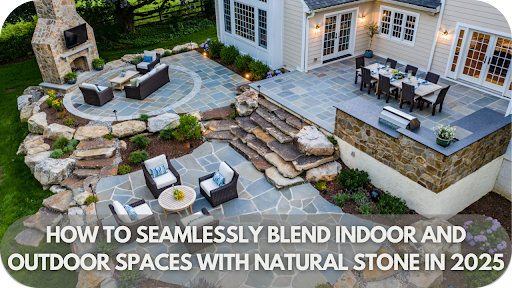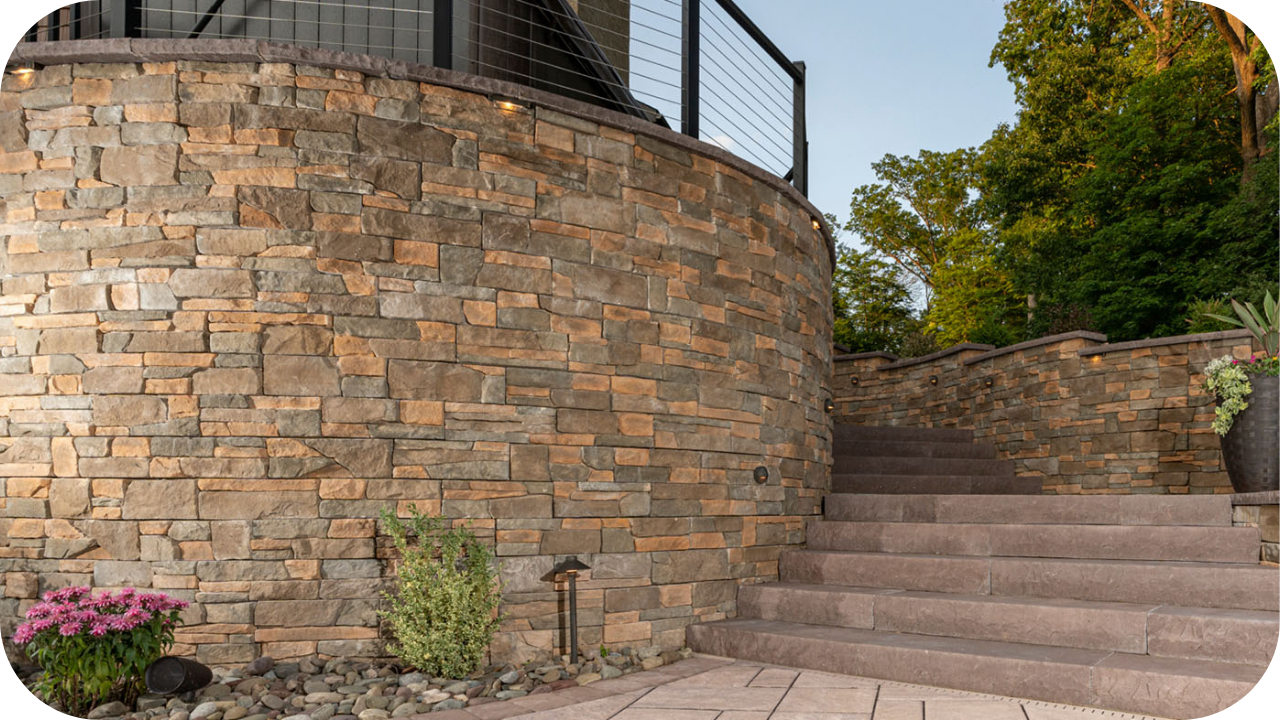
Picture this: you move from your cosy living room to a sunlit patio with no sharp boundaries—just one harmonious space.
As 2025 brings a fresh focus on merging indoor and outdoor living, natural stone stands out as the key to achieving that seamless look.
But how can you capture this perfect flow? This guide covers everything from unified flooring to earthy palettes and textures inspired by nature.
Ready to turn your home into a seamless sanctuary? Dive in to uncover every essential detail!
1. Ensure Unified Flooring for Indoor-Outdoor Continuity
Creating a seamless flow between indoor and outdoor spaces starts with unified flooring. Using the same type of stone flooring inside and outside removes visual barriers and encourages a smooth transition.
This approach enhances the sense of openness and brings an expansive feel to any space. Natural stones like limestone, sandstone, or travertine work exceptionally well for this purpose due to their durability and versatility.
These stones withstand varying weather conditions outdoors while retaining elegance indoors, making them ideal for high-traffic areas. With unified flooring, your indoor and outdoor areas will feel connected, fostering a harmonious and inviting atmosphere.
2. Use Complementary Textures and Finishes
Balancing indoor elegance with outdoor functionality is essential when designing a cohesive indoor-outdoor space. To achieve this, choose polished stone finishes for indoor areas, which add sophistication and are easy to maintain.
Outdoors, opt for honed or textured finishes that resist slipping and provide a natural, rugged appeal that blends with the landscape.
This strategic finish contrast considers aesthetics and functionality, especially in spaces exposed to the elements.
Honed finishes add depth and visual interest, creating a subtle yet effective transition that harmonises the indoor and outdoor experiences while ensuring safety and style.
3. Implement a Cohesive Colour Palette
Selecting a cohesive colour palette is vital for creating harmony between indoor and outdoor spaces.
Earthy, neutral tones—such as greys, beiges, and browns—are ideal as they work well with natural elements like plants, wood, and water features.
These colours integrate smoothly with outdoor landscapes while also complementing interior decor, establishing a visually unified look. A natural palette ensures your spaces blend seamlessly, promoting tranquillity and balance.
This colour scheme can be introduced through stone flooring, wall cladding, and other design elements, creating a soft transition that feels organic and enhances the flow between inside and outside.
4. Extend Stone Elements to Vertical Surfaces
Stone elements are not limited to floors alone; they can be extended vertically to unify indoor and outdoor spaces further.
Using stone cladding or walls both inside and outside creates a cohesive look that visually connects spaces.
For example, a stone-clad feature wall in the living room can extend to the outdoor patio, making the transition between spaces feel seamless.
Kitchen backsplashes or columns that carry the same stone pattern from inside to outside also create visual continuity.
These vertical applications enhance your home’s architectural style and add depth and texture, making the spaces feel integrated and harmonious.
5. Open Plan Layouts with Transitional Elements
Open-plan layouts are perfect for blending indoor and outdoor spaces, particularly when complemented with transitional elements.
Large sliding glass doors, bi-fold doors, or open archways serve as flexible boundaries, allowing you to open up spaces or section them off as needed.
When paired with natural stone flooring or walls that extend across these areas, the transition becomes nearly invisible, creating one continuous, versatile space.
Transitional elements like stone thresholds or step-downs can differentiate indoor from outdoor areas without interrupting the flow.
Open layouts, combined with stone’s organic textures, facilitate natural light, airflow, and a sense of freedom, making both indoor and outdoor areas feel like one cohesive environment.
Top Indoor-Outdoor Stone Design Trends to Look Out for in 2025
Step into 2025 with the latest trends in stone design that redefine indoor-outdoor spaces. From biophilic touches to bold patterns, these ideas bring sophistication, style, and seamless transitions to your home.
1. Biophilic Design with Natural Stone
Biophilic design in 2025 centres on bringing the outdoors in, using natural stone to cultivate a harmonious connection with nature.
Adding greenery alongside stone paths, stone planters, or cladded walls creates an immersive natural environment that feels both organic and calming, enhancing the indoor-outdoor experience.
2. Minimalist Outdoor Kitchens and Lounging Areas
Minimalism meets elegance with stone countertops, sinks, and seating in outdoor kitchens and lounging areas.
This 2025 trend favours streamlined, sophisticated designs that complement modern interiors while balancing style and functionality, perfect for hosting or relaxing in seamlessly integrated spaces.
3. Statement Stone Fireplaces and Fire Pits
Statement fireplaces and fire pits, crafted from natural stone, become focal points for both indoor and outdoor areas.
Rustic stone designs with a contemporary edge offer warmth and character. They blend effortlessly into living rooms or patios and elevate the home’s ambience with timeless charm.
4. Mixed Textures for Added Depth
Combining smooth and rough stone textures brings depth and visual interest to indoor-outdoor spaces.
In 2025, this trend uses contrasting finishes—such as polished stone indoors paired with rough textures outdoors—to create a dynamic look that’s both cohesive and engaging, making each area feel intentionally designed yet unified.
5. Geometric Patterns and Stone Inlays
Geometric patterns and stone inlays add a bold, modern twist to traditional stone use. By incorporating these elements into walls, flooring, or garden pathways, homeowners can introduce eye-catching designs that enhance the spatial flow.
This 2025 trend plays with shapes and patterns to make each space visually striking while maintaining elegance and refinement.
Top Stone Types for a Seamless Indoor-Outdoor Flow
Choosing the perfect stone can make all the difference in creating a cohesive, flowing indoor-outdoor space. Here’s a list of top stones that blend beauty, durability, and functionality for a flawless transition.
1. Limestone
Due to its soft, warm tones and smooth texture, limestone is an excellent choice for creating a seamless transition between indoor and outdoor spaces.
It’s versatile enough to be used both indoors and outdoors, offering a continuous flow. Ideal for living room flooring that extends to patios or garden paths, limestone adds a timeless, elegant touch while providing durability and ease of maintenance in high-traffic areas.
2. Travertine
Travertine’s earthy texture and natural slip resistance make it perfect for high-traffic areas like poolside spaces and bathrooms.
Its unique appearance, with pitted surfaces and rich colours, adds a rustic charm that enhances both indoor and outdoor areas.
Travertine is ideal for creating a cohesive design, especially in covered outdoor spaces where its durability and resistance to weather conditions make it a long-lasting choice.
3. Sandstone
Sandstone offers a rustic, durable finish that’s perfect for creating a harmonious indoor-outdoor design.
Its excellent weather resilience suits it for outdoor applications such as patios, garden paths, and accent walls.
With its range of earthy tones, sandstone complements natural surroundings, blending seamlessly with the environment. This stone is ideal for homeowners seeking a timeless look that can withstand the elements while adding character to outdoor living spaces.
4. Marble (Use Sparingly)
Marble exudes luxury and elegance, making it an exceptional choice for indoor spaces. However, its delicate surface makes it unsuitable for heavy outdoor use.
It works best in limited applications such as indoor feature walls, countertops, or accent areas that don’t directly connect to outdoor spaces.
When used sparingly, marble brings an air of sophistication and refinement while ensuring that your outdoor areas maintain durability and practicality.
Tips for Maintaining Natural Stone Indoors and Outdoors
Keeping natural stone looking its best requires just a few essential maintenance steps. Follow these expert tips to preserve its beauty and durability, indoors and out!
- Regular Sealing and Cleaning: Apply a high-quality sealant to protect stone from weather and stains, ensuring long-lasting beauty and durability indoors and outdoors.
- Choose Sustainable and Ethically Sourced Stone: Opt for responsibly sourced stones to add property value and support eco-conscious practices, aligning with 2025’s sustainable design priorities.
- Use Stone-Safe Cleaning Products: Avoid harsh chemicals; use pH-neutral cleaners to prevent damage and preserve the stone’s natural finish.
- Address Spills Immediately: Wipe spills promptly to avoid stains, particularly on porous stones like marble and limestone, which can easily absorb liquids.
- Inspect and Repair Regularly: Periodically check for chips or cracks in outdoor stone and repair them promptly to prevent further damage from weather elements.
- Protect Outdoor Stone in Extreme Weather: Use covers or protective barriers for stone surfaces in harsh weather conditions to reduce wear and extend lifespan.
Conclusion
Blending indoor and outdoor spaces with natural stone creates a harmonious, stylish retreat. From unified flooring to statement walls and biophilic touches, natural stone adds durability and timeless elegance.
With 2025’s design trends focused on seamless transitions and sustainable choices, now is the perfect time to reimagine your space with stone.
Ready to craft a cohesive, nature-inspired home? View our expert range of natural stone options, and let Splendour in Stone help bring your vision to life!
More To Explore

How Can I Prevent Efflorescence From Occurring on Stirling Sandstone?
You’ve just installed stunning Stirling Sandstone, and it looks perfect—but then, white, powdery stains start creeping across the surface. What is it? And more importantly,

Heritage Walling Stone in Point Cook: Ideal for Timeless Homes
Point Cook is a suburb where heritage charm and contemporary design sit side by side. As more homeowners seek to add character and distinction to


